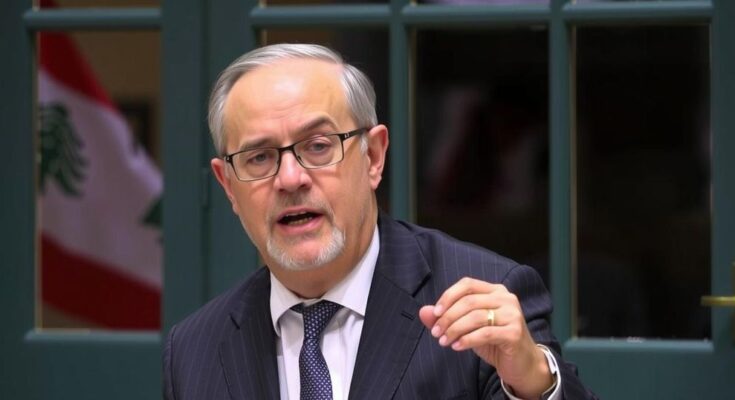Lebanon prepares to elect a new president amidst political and economic turmoil. After over a two-year gap without effective leadership, the election arises as a means to address urgent issues, including the needs created by recent conflicts. Joseph Aoun, a Military leader, is a prominent candidate with cross-party support. The election represents a crucial opportunity for Lebanon to regain stability and governance.
Lebanon stands on the cusp of electing a new president after enduring over two years without a legitimate head of state. The election, scheduled for Thursday, arises amidst profound political and economic turmoil, which has left the country seeking stability. The fragile transitional government of Prime Minister Najib Mikati lacks sufficient authority to address the multitude of crises, including a severe economic downturn, frozen bank deposits, and widespread inflation. The backdrop for this election is marked by a ceasefire between Israel and Hezbollah, which necessitates a functioning executive to enforce its terms, expiring at the end of January.
The complexities of Lebanon’s fragmented political landscape, rooted in its confessional system that allocates political positions based on religious affiliations, adds urgency to the election process. Chief among the candidates is Joseph Aoun, a Maronite Christian and commander of the Lebanese Armed Forces, whose potential candidacy has garnered support from various factions following Hezbollah’s shifting stance. Political analysts suggest that Hezbollah’s relative decline in influence after recent conflicts has opened the door for Aoun, enhancing his viability as a candidate who could symbolize a new beginning for Lebanon.
The critical need for a unifying figure is underscored by reports of approximately 1.3 million internally displaced individuals due to ongoing conflicts, which further complicates Lebanon’s struggles. Despite the political infighting and economic crises, the desire for an elected government remains strong among the populace, signaling a hope for a transition from interim governance to a legitimate authority. The forthcoming election, therefore, represents not only a possible change in leadership but also a pivotal moment for Lebanon to reclaim stability and sovereignty after years of unrest.
Lebanon has grappled with political instability and economic hardship, with the absence of a functioning president exacerbating these issues. The political structure, which is heavily influenced by ethnic and religious affiliations, complicates the electoral process and party negotiations. The recent ceasefire agreement between Israel and Hezbollah adds a layer of urgency to the need for an effective government, as the country seeks to stabilize post-conflict. Given the culmination of crises, the upcoming presidential election is seen as vital to Lebanon’s restoration and governance.
In conclusion, Lebanon’s impending presidential election carries significant implications for the country’s political future. With a dire need for stability and effective governance, candidates like Joseph Aoun emerge as symbols of potential renewal. The intricate balance of power among Lebanon’s diverse factions underscores the challenges ahead, but the election represents a critical opportunity for the nation to reestablish a legitimate authority and make progress towards resolving its entrenched crises.
Original Source: www.dw.com




